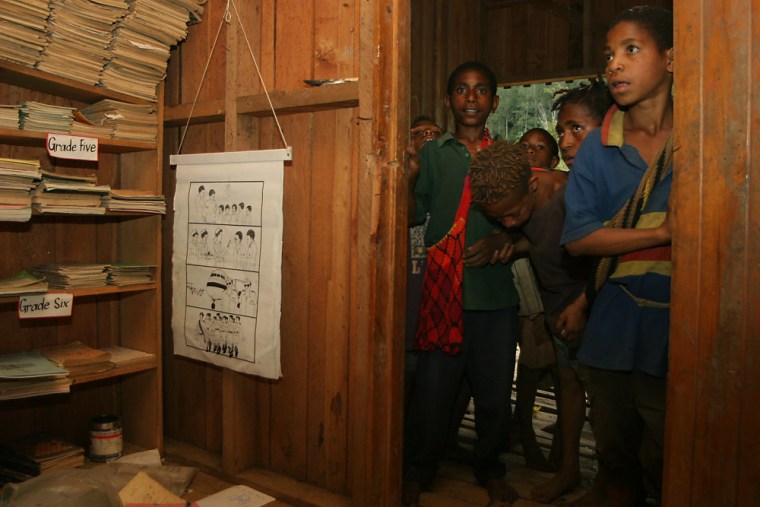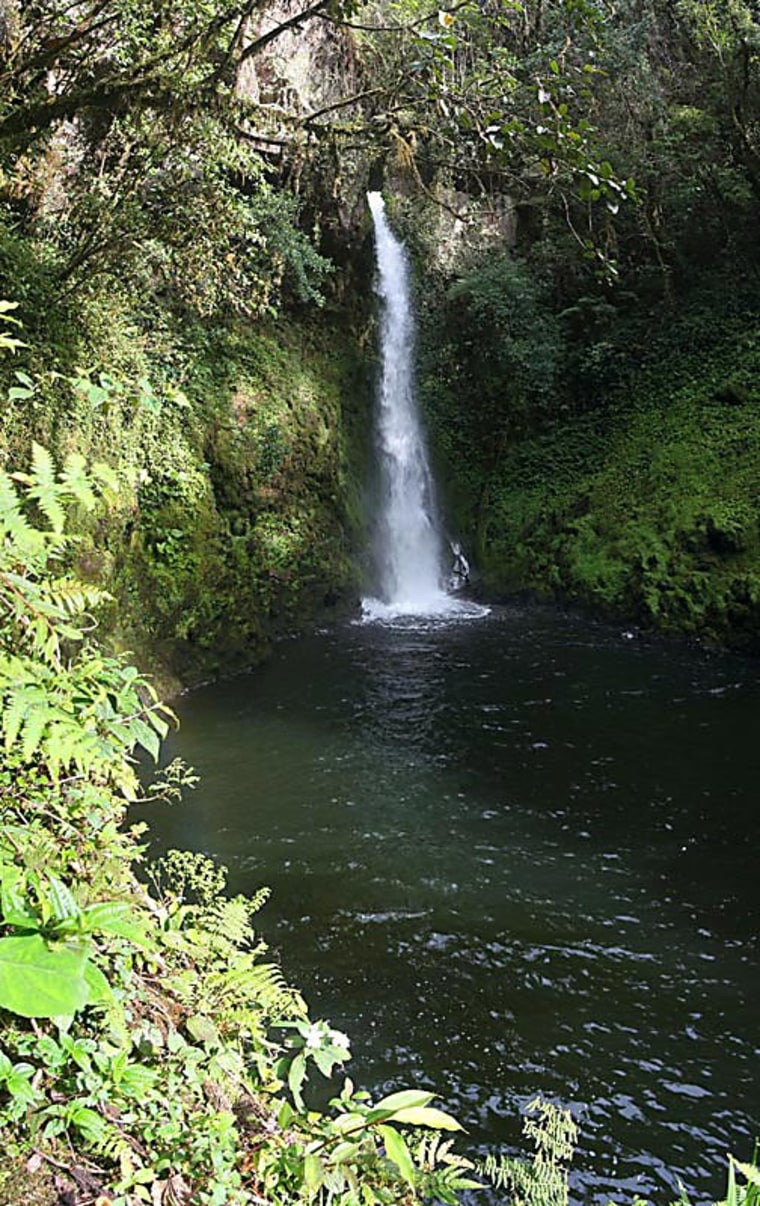We cross over the sharp limestone pinnacles and wastes of the Muller Range, and begin to drop into the Tari Valley, one of the last places on earth to record first contact. The basin itself was first viewed by blue eyes in 1934, when Australian gold miners Jack Hide and Peter O’Malley crossed the great Papuan Plateau, and stumbled into the land of the Huli.
Remote pockets of clans were discovered over the next few decades, with the last cluster encountered in the early 1960s. Many believe isolated villages are yet to be found in the extreme reaches, and when looking at the thick multi-layered canopy of blue-green primary rainforest it is easy to believe this so.
On a forest trail we meet Paul Poko, a short, muscular man with heavy brows over deep- set eyes. He seems like a man you might meet on a tropical walk, except he sports a skirt of curled tanket leaves rustling over his buttocks, a knife carved from the thigh-bone of a cassowary in his belt, and his head is capped by a wide wig of human hair, extravagantly festooned with birds of paradise feathers. It looks like something from Napoleon’s haberdashery, but it is not at all unusual among the so-called Huli Wigmen.
Paul is traveling with four of his cousins, similarly adorned, from the village of Tagibi, our destination. The Huli are the largest ethnic group in the Southern Highlands, smack in the center of Papua New Guinea, with a population around 50,000 in a fertile vale encased in 11,000’-high razor-ridged peaks.
Trekking the Tari Gap
Paul and his kin offer to guide us, so along a tangled path we trek, past waterfalls that spill diamonds, across swinging rattan cane bridges, by great boles of southern beech, wild begonias, rhododendrons, and delicate hanging orchids that look as though they have been professionally arranged. At times the rainforest closes in on us with an airless gloom as we thrash through a creepered world of endless twilight, slog across rivers, and bounce over rank, springing vegetation, all part of the oldest, richest, most stable ecosystem on earth.
The first Huli village we reach is the mile-high Benaria, where, in the cool middle-morning of a school day, we are circled and contained by a gaggle of children sucking on sugar cane. Out of the flock steps Tommy Tim, 36, the headmaster and sole teacher for the Benaria School that serves grades 1 through 6 with some 200 students from the 10 closest villages. It is Tommy’s 18th year as a teacher, and he has never been more distraught. School is out, but not for holiday.
The school, Tommy tells us, was established in 1960 by Evangelical missionaries, along with the church and clinic. The missionaries still make irregular visits, landing at the overgrown air strip next to the graveyard, bringing in Bibles and the latest word of God. But the money has stopped.
Tommy takes us for a tour of the bare-bones school house which sits on a rise above a clear-running creek. Out front is the rusted rim of a truck tire, used as the school bell. Inside the walls are bare. There are no appurtenances… no lights, no charts or dioramas; no desks, tables, seats or furniture of any kind. No learning tools at all — just a single blackboard, with no chalk.
School's out
The children normally sit on the floor and listen as Tommy or one of his three assistants lecture. When the school is open some of the children walk 10 miles a day in each direction. Some walk 12. Those who live in villages farther away don’t make it to the classroom, as their daylight hours would be consumed in the trek.
Tommy takes us to his office, a padlocked shack near the school house. Above the entrance is a list of commandments, written in Huli, for the students: “I will not fight; I will not swear; I will not smoke; I will not gamble; I will not steal.” At least the last is not adhered to with universal reverence, as Tommy shares that just last month some of his students broke into his office and stole all the pencils. They also stole the volleyball for recess. (There are also no police in Benaria — the nearest are a day’s walk away.)

The most distinguishing feature of Tommy’s office is an enormous pile of uncracked bricks of copy paper. Conspicuous in its absence is a copier, mimeograph, scanner, or any device that might use the coated stock. He explains that Evangelicals used to finance the school and other services in the village, but since 1975, when Papua New Guinea became independent, things have gone desperately down hill. It was the provincial government that supplied the copy paper, but it never found the funds to supply a copier.
In fact, Tommy explains, the reason the school is closed is that the government has not sent the funds to pay his three assistants. At his own expense, while still recovering from a bout of malaria, he made the two-day trip last month to the provincial headquarters to see if he could collect the promised monies. But he came back empty handed, and had to close the school.
“What would it cost to reopen the school?” we ask.
“It would be 300 kina to pay what we owe, and the assistants would come back.”
That’s about $100. Among us we take up a collection, and ask Tommy to step outside with his students. There Pasquale hands over the cash, and we all convey our gratitude for his work as a teacher.

“Thank you true,” Tommy replies. “These children don’t see whites very often. Why would they come here? Two years ago a tourist walked through, but no others. The children have not seen cars or motorbikes. They have not seen cameras. They see small planes, and wonder about the world beyond Benaria.
"My school, which teaches them about the world, will reopen because of you.”
We shake hands with the teacher and his students, and then as dark clouds shoulder up over the ridge we set out for Paul Poko’s family village, 2,000’ higher, and countless valleys away.
Great Escapes is exploring Papua New Guinea in search of the Digital Village, filing daily dispatches along the way. If you have a question or comment, mail us at greatescapes@msnbc.com.